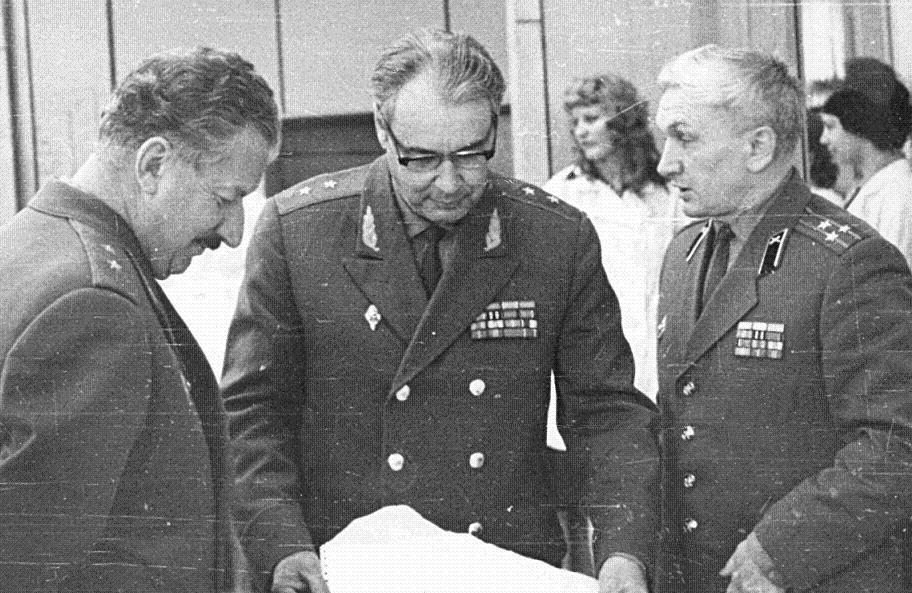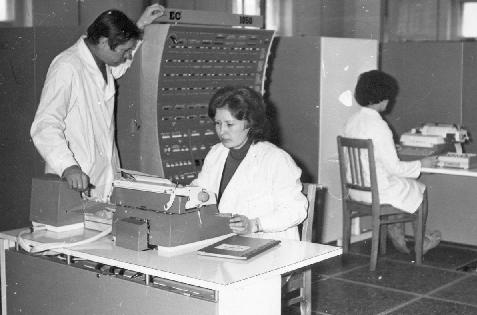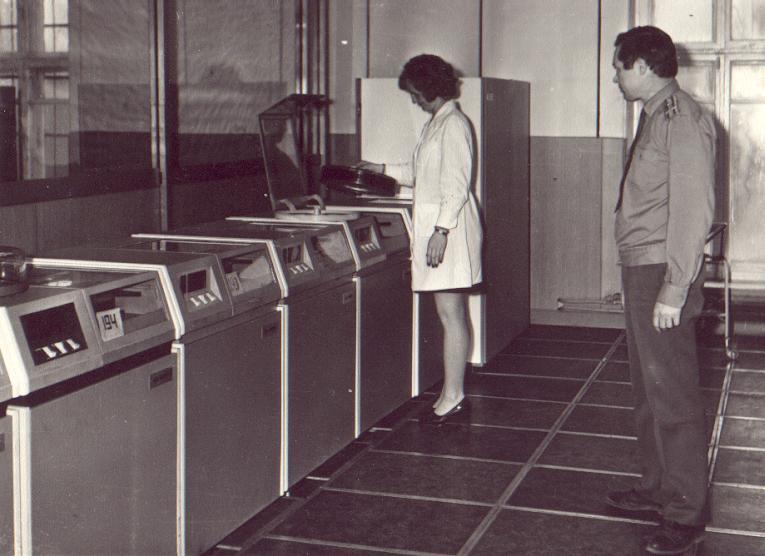Memoirs about my service in the Computer Cener of the Scientific-Research Institute of the Defence Ministry of the USSR.
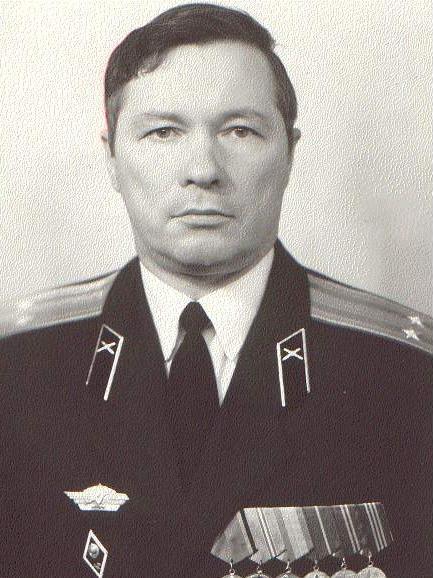
|
Lieutenant Colonel of the Soviet Army
while serving in Research Institute No. 4 of the Ministry of Defense of the USSR
Introduction
Myths have always played a big role in the history of all peoples, and in our time their influence on public life and even on global politics does not decrease. Only their content is reduced. One of the global myths of the 20th century was the myth of Soviet military power. For almost half a century, the Kremlin rulers have been an effective means of intimidating the United States and Western Europe. The myth almost died, but now it is being revived. There is a suspicion that this is a big bluff, because the military-scientific potential of Russia, which, among others, also represented NII-4, has evaporated. However, even during its heyday, the institute barely had time to adopt new ideas in the conditions of the Soviet Union.
This is discussed below. Extrapolating the past, we can more accurately imagine the true state of the modern RF Armed Forces.
Contrary to obvious facts and even understanding of the mythical essence of ideas about the armed forces of the USSR by people involved in them, such a policy was quite effective until this ugly empire collapsed under the pressure of internal contradictions. The foundations of the myth were laid in the victory over Germany in World War II, when the euphoria of victory clouded the many different factors that led to it. But already during the war, the superiority of the allies over the USSR in communications, and the detection of enemy military equipment and command and control was noticeable. It is worth at least mentioning the use by the Americans of electronic radar stations and even the first computers.
With computers in general, an anecdotal story came out. Because computing is an integral part of cybernetics, which Marxist-Leninist philosophers dubbed "reactionary pseudoscience," the development of computers in the Soviet Union was not carried out for almost a decade after the Americans developed their first vacuum tube computer for military purposes. (In fairness, it should be noted that the German Zuse was the first to do this before the war, but his machine worked on electromechanical relays). Over the entire period of the existence of the USSR, Soviet scientists could not overcome the backlog in computer technology, it even increased over the years, although scientists were required to catch up with the Americans. And this lag would be even greater if Kyiv enthusiasts did not assemble the first computer in continental Europe on their own. On the sly, in the basement of an abandoned monastery in Feofaniya, near Kyiv, they secretly, out of their own curiosity, assembled this machine on electronic tubes, sometimes even buying radio components at a flea market. When it finally dawned on the party leaders that cybernetics was not just another means of exploiting the working people, but a very useful thing, one of them sternly asked Soviet scientists: "Why are we lagging behind the Americans? Who is to blame?" Obviously, the Kyiv inventors failed to keep the secret, so the leader heard the following answer: "No way, in Kyiv our specialists have already created a similar machine." Such an answer probably saved someone from major trouble, but one could pay with one's life for lying. Therefore, an order was sent to Kyiv – the machine should be ready before the end of the year and no later, but it was 1950. Of course, funding was immediately found, but the designers were seriously scared because they were not making a computer, but only its model. However, surprisingly, the model worked well and could perform some simple tasks, so it was called "Small Electronic Computing Machine" (MESM). After that, the head of the project, S. A. Lebedev, with a group of leading specialists, was transferred to Moscow, where he became the chief designer of Soviet computers for many years. I know the little-known details of the creation of the first computer in Kyiv, since in 1959 I dismantled the MESM with a group of students to transport it to Kyiv Polytechnic Institute (KPI) for laboratory work, and therefore I heard with my own ears the stories of the people who created this machine. On occasion, you can see that at about the same time, the concept of an artificial satellite of the Earth was also almost clandestinely developed by a group of scientists from NII-4, in which I had to serve, which will be discussed below.
Beginning of military service
After graduating from the KPI, I, like several hundred other graduates of Soviet universities, was drafted into the army to serve in the missile forces, since there were no educational institutions of the necessary profile in the army at that time. I was destined to serve in these troops for 25 years, and I could know the true position of this branch of the Armed Forces of the USSR much better than members of the Politburo of the Central Committee of the Communist Party. Of course, like all rocket scientists, I had to keep my mouth shut in those days, but sometimes in a circle of good friends or relatives, when asked about the quality of Soviet weapons, I answered something like this: "Have you seen a Japanese tape recorder? Compare it with ours and you can imagine the difference as electronics, which is the basis of modern military technology." Of course, they didn’t believe my words about the imperfection of Soviet weapons, because, in the minds of people, consumer electronics could be unimportant, but military electronics could only be excellent. And I even heard from my own superiors more than once: "We are going into space on a cart!" The fact is that I served, as I already said, in the Scientific Research Institute No. 4 (NII-4) of the Ministry of Defense in the village of Bolshevo near Moscow. The Institute controlled the development, production, and implementation of rocket and space technology in the troops served the launches of satellites and spacecraft. About three thousand military engineers and scientists and the same number of civilians worked at the institute. Suffice it to say that among them there were more than a hundred doctors of science and several hundred candidates. As in any military unit, we had the so-called "commander training". Since we were a research institute, this training also had a somewhat different character than in the troops. In addition to demonstrations of interesting films about the US armed forces, made at the studio of the Main Intelligence Directorate of the General Staff (GRU GST), a series of lectures on philosophy, physics, and sometimes even biology, which were read mainly by professors from Moscow University, was organized for us. I well remember how, at a lecture on genetics, our scientists meticulously asked the lecturer, then still a young doctor, Maxim Frank-Kamenetsky, about the mechanism of cell division, to which he replied: “We raised this question before our physicists and biochemists, but nothing convincing from them achieved. In the West, it is easier for scientists – when they reach insoluble questions, they answer themselves that this is all from God, but we, atheists, have not been given such a right". He probably took on this issue himself, because he is now a well-known biophysicist and works at Boston University.
So, the lecturers behaved at lectures at times quite freely and we heard a lot of things that could not be read in books. All this, of course, influenced the formation of the worldview of young military scientists. True, in different ways. It should be said that there was a big difference between Ukrainian and Russian, mainly from Ryazan and Penza, who were the most among our colleagues. The Khrushchev thaw was felt even in the army, and we, the people of Kyiv, were fond of listening to radio broadcasts of various "foreign voices", we listened more to Radio Liberty and Voice of America. On occasion, these broadcasts were discussed quite openly between us, especially since our superiors did not hide the fact that they were listening to the BBC radio, which was not jammed at all due to the caution of its transmissions. So, the Russian guys were rather cool about the discussions of the programs of "voices" somewhere in the smoking rooms and never took part in them, except that they just listened. I often subscribed to Polish newspapers and magazines, and during the Prague Spring, I bought Czech newspapers. Those Russians who knew about this treated me with suspicion, almost like a spy. And when the invasion of Czechoslovakia took place, they all took this event with great enthusiasm, but not us. However, no one denounced anyone to a special department. Only once, at the end of the service, did someone "pawn" me, but I suspect that not out of ideological considerations, but out of a sense of personal revenge. Times were already different and I escaped with a slight fright. Be that as it may, I think that my boss Viktor Frolovich Oborin found out about my "free-thinking", but the reaction was completely unexpected – he appointed me his deputy for political studies and sometimes gave me the task to go to the CPSU library and prepare "interesting" material for the seminar. But Viktor Frolovich, in my eyes, was himself a moderate freethinker. When, out of habit, or rather "according to Molotov", I somehow blurted out at a seminar that Germany attacked the USSR without declaring war, he immediately corrected me, noting that war had been declared, which I did not know about. Therefore, I understood the leader's hints and prepared not quite what was in the topic of the seminar. If the topic was, for example, "the decay of capitalism", then in my speech I developed the idea that "Leninist" capitalism had already "decayed" long ago, and now it has "revived" in a new incarnation and demonstrates certain achievements. The question of whether a new war is beneficial to the Americans was especially hotly debated. The majority, to the point of hoarseness, defended the opinion, formed by official propaganda, that the capitalists only profit from wars and they are indifferent to the suffering of the common people. At that time I was already studying the economic history of foreign countries and tried to convince my comrades by saying that wars harm international trade and are therefore not profitable for the majority of capitalists. After such statements, the discussion went very lively, the seminars dragged on, and at the end the boss usually said: “We somewhat deviated from the topic, but everyone took an active part in the seminar, so I give everyone “excellent.” Oborin was a Muscovite, and Muscovites were noticeably different at the breadth of horizons from those who came from from the "outback".
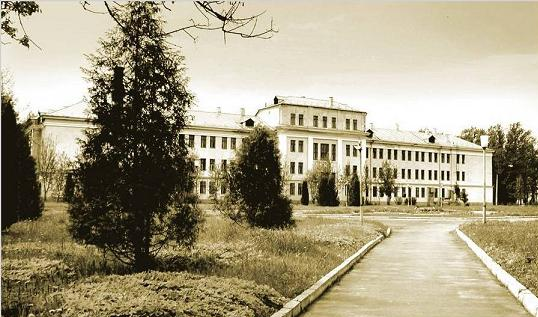
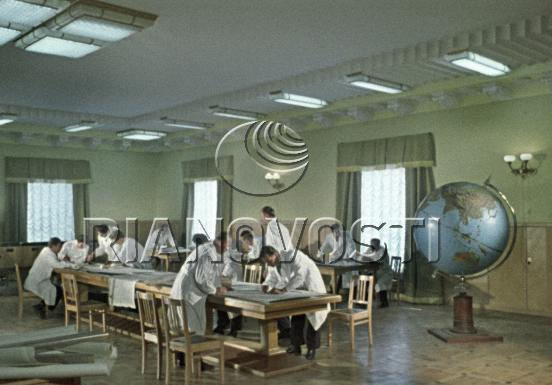
At left: The main building of the institute. At right Conference hall. Photo from "25840".
